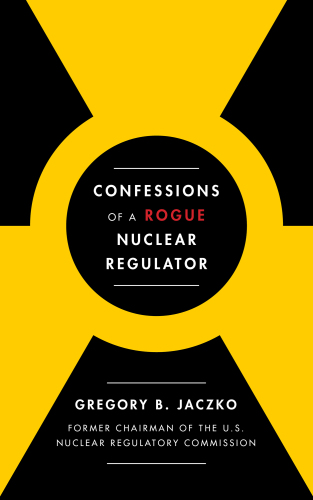
Confessions of a Rogue Nuclear Regulator
فرمت کتاب
ebook
تاریخ انتشار
2019
نویسنده
Gregory B. Jaczkoناشر
Simon & Schusterشابک
9781476755786
کتاب های مرتبط
- اطلاعات
- نقد و بررسی
- دیدگاه کاربران
نقد و بررسی

August 1, 2018
As former chair of the U.S. Nuclear Regulatory Commission (NRC), physicist Jaczko found the NRC dominated by the industry it was supposed to regulate and spoke out--particularly with the refusal to make the changes that would prevent another catastrophe like Fukushima.
Copyright 2018 Library Journal, LLC Used with permission.

October 15, 2018
A shrill, defensive tone mars this career memoir from Jaczko, chairman of the U.S. Nuclear Regulatory Commission during the Obama years, in which he argues that “nuclear power is a failed technology” “more hazardous than it is worth.” Presenting himself as an optimistic, science-centered political outsider, Jaczko tells a story of crusading for strengthened safety standards in the face of nuclear industry opposition. He details his battle against long-standing “enforcement discretion” for fire safety, his contribution to defeating a controversial proposed waste disposal site in Nevada, and his part in the American response to the Fukushima disaster. Jaczko’s tone turns personal in his outraged depiction of being ousted from the commission in 2012, framing his colleagues and staff as conspiring against him, their description of him as an “out-of-control bully” as a misunderstanding of his passionate intensity, and his hotheadedness as a loss of patience for “coddling the nuclear power industry.” Jaczko’s descriptions of plant processes are clear, but don’t convey any great interest in the underlying scientific principles, and the internal government politics he discusses come across as, sadly, business-as-usual, making it difficult to read the book as anything but a disgruntled, self-justifying polemic. Agent: Rob Weisbach, Rob Weisbach Literary Management.

October 15, 2018
The political education of a scientist-turned-nuclear energy regulator.As chairman of the U.S. Nuclear Regulatory Commission under President Barack Obama, Jaczko was not a political insider; nor was he beholden to the industry that had invested and reaped billions of dollars from the proliferation of nuclear energy. He maintains that he was "a nuclear power moderate" when appointed to the commission, though one who "had become skeptical of the ability of the nuclear power industry to properly balance its fiscal responsibility to shareholders with the demands of public safety." As with many regulatory agencies, nuclear power regulation seems to suffer from a fox-guarding-the-henhouse mentality. The financial stakes are huge, not only for the industry, but for those who benefit from the jobs the industry creates and the taxes it pays, which often support the communities where the reactors are located. Accidents are rare, but when they occur, as the lingering memory of Three Mile Island reminds us, the results can be devastating. Better safe than sorry, but how safe is safe? "What constitutes 'safety' is often determined by political, not just scientific, judgments," writes the author, who experienced political resistance funded by anti-regulation lobbying throughout his tenure. "I was hardly anyone's first choice for the job," he admits, as even the Obama administration that appointed him expressed skepticism over his lack of administrative experience and the staffers he would oversee weren't accustomed to working with someone so young (early 40s). Jaczko found himself consistently at odds not only with the industry he was charged with regulating and with their congressional supporters, but with the rest of his commission. The more he pushed for safeguards following the Japanese Fukushima accident in 2011, the stronger such resistance became, and he admits that "sometimes I behaved in a way that could be described as hotheaded." Since resigning in 2012, he now advocates from the outside and maintains that "nuclear power is a failed technology."A cautionary tale with a matter-of-fact tone.
COPYRIGHT(2018) Kirkus Reviews, ALL RIGHTS RESERVED.

























دیدگاه کاربران